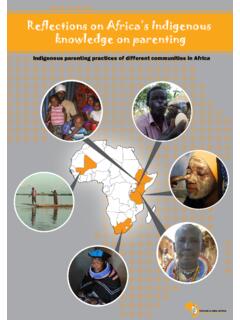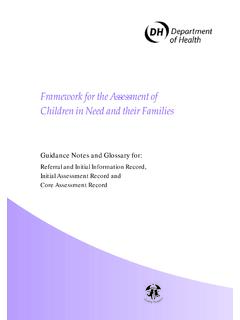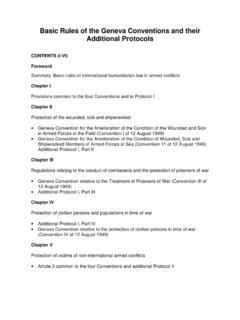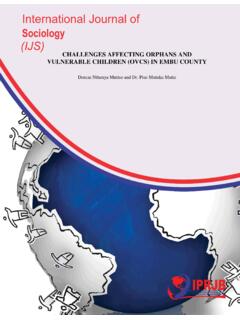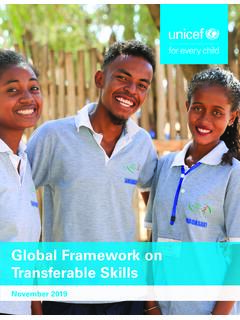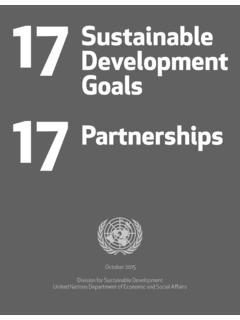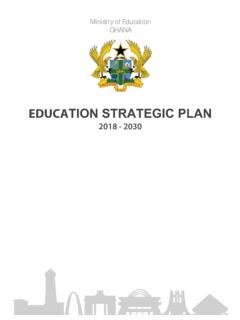Transcription of Better Parenting Facilitator Manual
1 Better Parenting Facilitator Manual4 Children NigeriaBetter Parenting Facilitator ManualCoordinating Comprehensive Care for Children (4 Children) is a five-year (2014-2019) USAID-funded project to improve health and well-being outcomes for orphans and vulnerable children (OVC) affected by HIV and AIDS and other adversities. The project aims to assist OVC by building technical and organisational capacity, strengthening essential components of the social service system, and improving linkages with health and other sectors. The project is implemented through a consortium led by Catholic Relief Services with partners IntraHealth International, Pact, Plan International, Maestral International and publication is made possible by the generous support of the American people through the United States President s Emergency Plan for AIDS Relief (PEPFAR) and the United States Agency for International development (USAID) under cooperative agreement AID-OAA-A-14-000-1.
2 The contents are the responsibility of the Coordinating Comprehensive Care for Children (4 Children) project and do not necessarily reflect the views of USAID or the United States Government. AcknowledgementsThe development of the original Community Discussion Guide was made possible by the generous support of the American people through the United States Agency for International development (USAID), Cooperative Agreement Number AID-663-A-11-00005 for Ethiopia s Yekokeb Berhan Program for Highly Vulnerable Children (HVC). USAID further supported the adaptation and expansion of this material for the Sustainable Outcomes for Children and Youth project in Uganda through their Cooperative Agreement AID-617-A-15-00005. Staff affiliated with FHI 360 drafted the original version in conjunction with Pact, as part of Pact s Yekokeb Berhan programme for Highly Vulnerable Children (HVC) in Ethiopia. It was pioneered by parents, guardians, volunteers and staff of 39 implementing partners with 500,000 highly vulnerable children and their families.
3 Lucy Y. Steinitz at Pact and Medhanit Wube at FHI 360 provided overall technical leadership together with illustrator Wobhset Sehalu and layout artist Worknesh Kerata. Later revisions were provided for a broader distribution through REPSSI, the Regional Psychosocial Support Initiative and for the Sustainable Outcomes for Children and Youth project in Uganda. These revisions were led by Lucy Y. Steinitz, with support from Jonathan Morgan at REPSSI, Francis Alumai and Rehema Kajungu of TPO Uganda and Mango Tree. Adaptations for Nigeria (2016) were retitled Better Parenting Plus: Community Discussion Guide in order to reflect expanded contents and application. This current version was improved in 2018 in response to the need for supplemental early childhood development (ECD), Parenting adolescents and up-to-date HIV Haruna at 4 Children Nigeria provided overall technical leadership for the adaptation of the Better Parenting Plus for Nigeria with support from 4 Children senior technical advisors.
4 The illustrations and design were done by Godwin Ondoma. The 2018 version is further informed by the CRS Compendium of Tools for Integrating early childhood development into CRS Programs (2015), the WHO and unicef , Care for child development : Improving the care for young children and The Amazing Teen Brain: What Parents Need to Know by Chamberlain and Ethiopia/Yekokeb Berhan programme for Highly Vulnerable ChildrenBole Kifle Ketema, Kebele 20 House No. 2129, Box 13180, Addis Ababa, EthiopiaTelephone: (251) 11-661-4800 / Regional Psychosocial Support Oak Avenue, Randburg, Johannesburg, Gauteng 2125, South AfricaTelephone: (27) 11 998 5820 / Relief Services UgandaPlot 577, Block 15, Nsambya Box 30086, Kampala, UgandaT +256 414 267 733 / +256 312 265 658 / Relief Services NigeriaPlot 512, Cadastral Zone B09,Behind NAF Conference Centre,Kado District, FCT Abuja, Nigeria / 2012 (original); July 2014 (revised for REPSSI); May 2016 (expanded for Uganda); September 2016 (adapted for Nigeria); May 2018 (final expansion for Nigeria).
5 Introduction ..ivThe Better Parenting Model ..1 a. Becoming a Better Parenting Facilitator ..2 b. The Community Discussion Guide ..3 c. Delivering Better Parenting ..4 d. Facilitating Better Parenting Sessions ..6 Session Supplements for Facilitators ..11 a. Cross-cutting: Sessions b. Other Family Issues: Sessions 15-20 ..36 Optional Modules ..49 a. early childhood development : Supplemental Sessions 1-4 ..49 b. Parenting Adolescents: Supplemental Sessions 1-4 .. Caregiver Pre- and Post- Tests and Answer Guide ..61 Table of ContentsBetter Parenting Facilitator ManualiiIntroductionParenting is critical in supporting and shaping children s health and educational, emotional and developmental outcomes, as well as in supporting overall family well-being. The importance of Parenting is documented in a large body of research. Parenting that is supportive, proactive, responsive and involved promotes children s positive adjustment, whereas Parenting that is neglectful, abusive, rejecting and controlling can result in poor outcomes.
6 Parenting that is warm and supportive beginning early in the child s life, even prenatally, leads to strong and secure relationships between parent and child, and can protect children from negative outcomes as a result of adverse experiences. Optimal Parenting includes a connected relationship and interactions to ensure that children are cared for physically (providing nutritious food, health care, adequate sleep and safe environment), cognitively (offering opportunities to learn, explore and use language), socially (responding to children with consistent, loving care, teaching children right and wrong, and enabling children to develop independence safely) and emotionally (supporting the child s sense of self-worth). Parenting can be hard, but many parents and caregivers, find that getting a Better understanding of children s development , along with learning and sharing techniques in Parenting , can improve communication between parent and child, and reduce harsh discipline.
7 Parenting programs are designed to improve one or more of these aspects of caregiving. The ability to parent well is not necessarily intuitive an individual s Parenting style is influenced by aspects of his or her own history, personality and temperament, together with characteristics of the child, such as age or temperament. Class, culture, religion and neighbourhood or community also shape Parenting practices. Better Parenting Nigeria can help!What is Parenting education? Parenting education is any programme , support, resource and/or service designed to increase parents capacities to care for and protect their children. The goal of Parenting programmes is to reduce the number of risk factors a family faces while strengthening and building on protective factors ( , knowledge and skills, access to resources, etc.). Traditionally, there has been exclusive focus on identifying risks and eliminating them. The current emphasis is on building up the protective factors that help children and families be resilient and develop the skills, characteristics, knowledge and relationships to face the risks.
8 This approach has been found to contribute to both short- and long-term positive outcomes. Using a protective factors approach is a positive way to engage families, because it focuses on families strengths, builds a base for lifelong positive parent-child relationships, and can provide a strong platform for collaborative partnerships with other service providers. 1 Collins, W., Maccoby, E., Steinberg, L., Hetherington, E. & Bornstein, M. (2000) Contemporary research on Parenting : The case for na-ture and nurture. American Psychologist, 55, 218-232; Smit, F., Driessem, G., Seegers, P. & Teelken, C. (2008) Scrutinizing the balance: Parental care versus educational responsibilities in a changing society. early Child development and Care, 178, , S. & Lansford, J. (2010) Evaluation of the Better Parenting programme in Jordan. early Child development and Care, Connor, T. & Scott, S. (2007) Parenting and Outcomes for Children, from Parenting and the Different Ways It Can Affect Children s Lives (Uttering, D.)
9 ; editor), Joseph Rountree , L. (2003) Best practices for parent education: Programs seeking to prevent child abuse. Retrieved December 13, 2009, from Parenting Facilitator Manual1 The Better Parenting ModelBetter Parenting Nigeria is a Parenting education program whose goal is to see that families have the knowledge and skills needed to raise healthy, safe and resilient children. The program has three basic strategic objectives:1. The caregiver-child relationship is strengthened;2. Caregiver capacity to understand family needs and access resources and services is increased; and3. Caregiver capacity to protect children from all forms of harm and exploitation is was this model selected for Nigeria, and how has it been adapted? Better Parenting Nigeria is a discussion peer learning and sharing model. Exchange is promoted by a Parenting Facilitator posing questions, guiding the discussion and emphasizing good practices, encouraging participation, praising examples of good Parenting , and gently correcting information if negative advice is shared.
10 In its original form, Better Parenting was developed, pre-tested, implemented and evaluated in Ethiopia. The programme showed evidence of significant positive change in Parenting knowledge, improved adult-child communication and a reduction in harsh discipline. It was subsequently adapted for Uganda and then Nigeria. Better Parenting Nigeria (BPN) can be used for short-session group discussions, as well as for one-on-one guidance in the topics were added to the Better Parenting currculum in accordance with the strategic objectives of the Coordinating Comprehensive Care for Children Project Nigeria in 2016. The pictures were changed to fit the Nigerian context. After use in 33 states in Nigeria and feedback from all facilitators, caregivers and children were collated. The Nigeria model was reduced to 20 sessions with optional modules on early childhood development and Parenting model includes the Facilitator s Manual , Community Discussion Guide, a Training Supplement and a Monitoring and Evaluation Facilitator s Manual is for the Facilitator to use to support the community discussions, provide targeted messaging, and recommend suggestions for knowledge and experience sharing.


